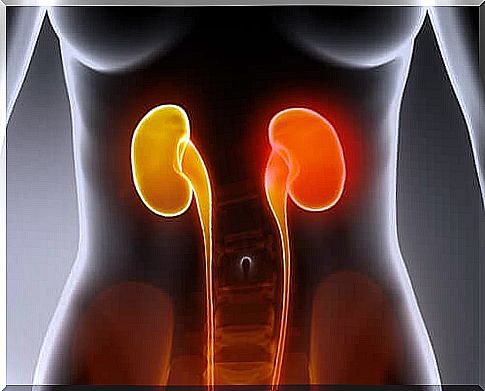Hyperphosphatemia: High Concentrations Of Phosphate In The Blood

We speak of hyperphosphatemia when there are higher values of phosphorus in the blood than normal. In fact, not all types of phosphorus are taken into account in this measure, only inorganic phosphorus.
Although it depends on the laboratory carrying out the analyzes, normal phosphorus values range between 2.5 and 4.5 mg / dL. When blood tests show values above 4.5, a diagnosis of hyperphosphatemia can be made.
The functions of phosphorus in the human body
Phosphorus is an element that performs very important functions within the human organism. Although most of us ignore it, it is a macro-mineral that the body needs to perform metabolic functions, which it could not otherwise accomplish.
Of all the phosphorus in our body, more than two thirds is contained in the bones. The rest is present in the tissue cells, and is involved in the energy generation mechanism.
Precisely because of this distribution in the body, the bones and teeth are the areas most affected by a deficit (or an accumulation) of this element. On the other hand, phosphorus is an ally of calcium, which is why hyperphosphatemia can cause kidney changes.
Phosphorus enters the body through food, generally when we follow a varied diet. Under normal conditions, this excess mineral that the body does not need is eliminated in the urine and feces.
The foods richest in phosphorus are red and white meats and nuts, such as almonds and walnuts. It is also present in good quantities in dairy products, such as milk, yogurt and cheese. Some countries have introduced food laws that require the food industry to add phosphorus to certain products, as a form of mineral enrichment.
The causes of hyperphosphatemia
Hyperphosphatemia is more common in older people, since its main cause is kidney failure. This condition, in which the kidneys are unable to concentrate urine, is more common among the elderly. In addition to kidney failure, there are other causes for hyperphosphataemia:
- Hypoparathyroidism: Parathyroid hormone (PTH) regulates the metabolism of phosphorus and calcium. In hypoparathyroidism, there is little or no production of this hormone, resulting in a decrease in calcium and an increase in phosphorus in the blood.
- Hypervitaminosis D : along with the regulation of calcium and phosphorus, hyperphosphatemia is also related to vitamin D. This can occur due to a dysfunction in the adrenal glands that alters vitamin D levels or an excess of this vitamin in the blood due to to other causes. In both cases, an increase in blood phosphorus can occur.
- High Phosphorus Consumption : Hyperphosphatemia caused by excessive ingestion of this mineral is rare. In fact, if the organism is functioning properly, it will eliminate it through the urine and feces.
- Prolonged Exercise : Exhausting, long-lasting physical activity damages muscles by releasing phosphorus from muscle cells into the bloodstream.
- Chemotherapy : When a person receives chemotherapy drugs due to cancer, the cells that die quickly release phosphorus into the bloodstream, causing hyperphosphataemia. This effect is known as tumor lysis syndrome, along with other symptoms produced by chemotherapy.

Symptoms of hyperphosphatemia
A high concentration of phosphate in the blood can be accidentally diagnosed due to symptoms that make this condition suspect. In most cases, abnormal values are noticed following a prescription for a general blood test to evaluate other pathologies.
Patients suffering from this condition do not experience symptoms directly associated with the increase in the level of phosphorus in the blood. However, they can see their doctor for kidney problems resulting from it, or even for some muscle problems.
When the phosphorus in the blood increases, the amount of calcium usually decreases, producing a hypocalcemia. In these conditions, the patient suffers from frequent cramps, which can also lead to spasms.
Another long-term consequence is the alteration of the arterial walls. Excess phosphorus can build up in blood vessel walls, in combination with calcium, contributing to arteriosclerosis and increasing the risk of serious cardiovascular episodes.

Treatment of hyperphosphatemia
When hyperphosphatemia is generated by an underlying disease, such as kidney failure or hypoparathyroidism, then treatment will involve correcting this condition. However, there are three alternatives to treat excess phosphorus :
- Diet low in phosphates : with the help of a nutritionist, a diet that does not exceed 1000 mg of phosphorus per day is developed.
- Dialysis : by artificially filtering the blood, it replaces the functioning of the kidney when it is not working at its maximum capacity.
- Chelators : some drugs combine with the phosphorus that we ingest with food to prevent the intestine from absorbing it. In this way, the phosphorus is eliminated from the body without entering the circulation.
Obviously, the doctor will decide on the most appropriate treatment in each case. Typically, no extreme measures are needed, so if you’ve been diagnosed with hyperphosphataemia, don’t be alarmed. It is advisable to consult your doctor to evaluate the steps to be taken.









